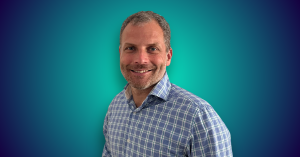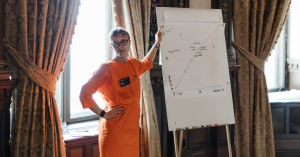“The EdTech sector has boomed in recent years and is living its golden age,” says Felix Ohswald, Co-Founder and CEO at GoStudent, the Vienna-born online tutoring platform that became the first European unicorn edtech startup in 2021. With a valuation of over US$ 3.5B, GoStudent is the most valued K-12 (from kindergarten to 12th grade in high school) EdTech company in Europe.
With a presence in 20 countries, more than 1,600 employees, a Tutor Community that counts 23,000 self-employed tutors, and over 1.5M sessions booked every month via the platform, GoStudent seems to be on the winning edge of the European edtech market.
Given that in 2022, there are 36 edtech unicorns globally and only 1 in Europe, The Recursive wanted to find out what is the secret recipe for scaling a sustainable edtech business in the European context and pass it on to regional edtech founders.
In a follow-up interview with The Recursive after Web Summit 2022, Felix Ohswald, shares his tips on how to grow an edtech unicorn. CEE edtech founders, dig into his advice and lessons learned.
The Recursive: What is the right way to pitch an edtech startup to investors?
Felix Ohswald: First and foremost, it is key to know your mission and firmly believe in it. What is it that you are willing to address or change? What are the real-world implications of your service or product? Is that scalable in the long run? Before you can start approaching investors and get the necessary funds to grow your business idea you need to prove to yourself and those around you that you, before anyone else, believe in your company. You must have a clear understanding of the market and predict how your company could potentially grow.
Spending time building your network is also crucial. For someone who has not founded a company before, making connections can be tricky. When Gregor and I founded GoStudent, we leveraged our existing network of friends, family and colleagues asking for as many introductions as possible. This way, we managed to establish links with private investors or people directly involved in investment firms.
Also, having a strong team from the very early stages is key as investors place their trust in a company because they believe the existing team is talented, motivated and can execute the operational aspects of a business successfully.
With GoStudent, we were able to close four big investment rounds, for a total of US$ 669M. This was partly due to the pandemic accelerating the overall speed of the fundraising process. Before, most investors would expect to meet the founders and the management team in person, which involved a lot of time-consuming traveling. Luckily, that has completely changed over the past couple of years. Nowadays you can raise even big investments in just a couple of weeks, which was almost impossible before.
Finally, my last piece of advice when dealing with investors is to always create FOMO (fear of missing out). Only if you manage to generate buzz around your fundraising campaign and your expected deadline, you will be able to close it fast.
What are your lessons learned on choosing the business model and monetization for an edtech startup?
The early days and first years of GoStudent were not always easy because we hadn’t figured out the right business model yet. As we did not have any revenue, we were dependent on external parties funding our efforts.
In early 2019 we faced a situation where an investor backed out of a financing round just one day before signing, and it would have brought us into default because we could not have paid our employees.
Luckily, another party stepped in at the last moment, and we were able to keep going, but this experience taught us a valuable lesson in resilience and in not taking anything for granted. The experience made us stronger and refocused our efforts to find a sustainable business model.
How do you go about international expansion as an edtech startup? What is your go-to-market strategy for entering new markets?
Before an expansion, we assess the market to identify our next growth opportunities. We explore key metrics, such as the demand for tutoring, competition level, purchasing power, and more. In addition, we examine the cultural differences and the habits around tutoring in general.
Next, is the recruitment of the local launch team, composed of a country manager and a few employees managing the local operations. Our local teams are very large due to the operational nature of our business model, so hiring the right people is crucial. Specifically, when entering a new market, it is so important to ensure that they have a 100% culture fit with GoStudent and have a comprehensive understanding of the local market. We always recommend being part of the hiring of the first 10-20 employees or delegating to someone you know well and trust 100%.
When entering a new market, companies inevitably must deal with localisation. The product features, marketing campaigns and sales pitches, among others, need to be localized from a cultural perspective. One can never underestimate the importance of linguistic and cultural nuances. Companies must ensure that they do not simply translate, but that they also understand the culture word for word – only then can the service adapt optimally to the new market.
Finally, trust your gut feeling, roll up your sleeves, and be confident that you’ll handle whatever comes your way. Success is a state of mind, not a science!
After COVID, edtech founders were offered a great opportunity to bridge the gap in digital learning. Do you believe that the demand for digital learning services and products is here to stay?
I’m confident to say that technology-led remote learning is here to stay, and it holds promise for addressing inequality and building skills to ensure a better future.
Education Technology is playing a major role in reshaping traditional education: learning is now more personalized and inclusive than ever before. Technological innovations are helping to break down geographical barriers, making quality education more widely accessible.
E-learning, video conferencing, interactive teaching tools and file-sharing products have seen a considerable uptick in recent years and, given that the time spent home-schooling allowed for trust in these types of technology to be built, I’d anticipate that they will continue to be commonplace as schools and students explore blended learning approaches.
For us specifically, as a 1:1 online tutoring platform, the pandemic actually led to an initial decrease in interest. With global lockdowns hitting in early 2020 and school closures, parents were not searching for tutoring. As a result, we had to completely reposition ourselves and rethink how we approached customers. The pandemic, however, was certainly an accelerator for awareness and trust regarding online solutions. This has led to a major change in attitude, which was followed by a surge of interest once the initial disruptions had passed.
Parents and students are now quite familiar with digital learning tools and have realised that video-based tutoring can be hugely effective. Even now that “physical” school is back, many have decided to embrace a hybrid model, with a mix of ‘traditional’ classes in the morning and 1:1 online lessons in the afternoon.
GoStudent started small – in the basement of a sailing school in Vienna. What kept you going in those early days?
I’ve always been passionate about education and I especially love mathematics. My grandfather was a teacher and, from a very young age, he nurtured my curiosity about numbers. He wouldn’t just explain things to me, he would frame his teachings in a real-life context, making each concept feel tangible and exciting.
It was in 2015, whilst I was completing my master’s degree, that I realized the need for far more teachers like my grandfather. My younger brother Moritz began referring his classmates to me for help with their maths homework. I was happy to help, and word spread. I was quickly surprised by how many students were reaching out to me. It seemed they all lacked support and had lost enthusiasm for the subject. I knew that this was an enormous issue and wanted to find a way to solve this fundamental problem. It was then that I reached out to my friend and GoStudent’s co-founder and COO Gregor Müller. Together we discussed how to develop a technology that could connect children all over the world with the best teachers. What had started as a homework chat, rapidly evolved into a 1:1 online tutoring platform. GoStudent was born.
The first years of GoStudent were quite challenging and bumpy. Anyone who decides to start a business must take into account difficulties and possible setbacks. Even if you believe in your idea wholeheartedly, it takes time to convince others of its importance, needs or ability to succeed. When embarking on an entrepreneurial venture, it is key to be mentally prepared for setbacks, firmly believe in your idea, pre-empt possible criticism and be ready to counter it with valuable insights.







